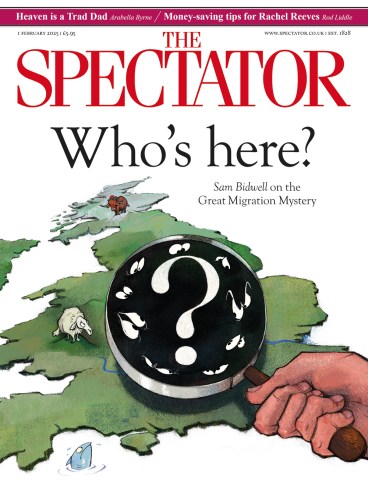
The muddle about who’s to be the next British ambassador in Washington has been only a small part of the grandiose confusion which surrounds Donald Trump’s assumption of power. Sir Keir Starmer announced that Lord Peter Mandelson would bring ‘unrivalled experience to the role and take [the Anglo-American] partnership from strength to strength’, apparently without checking first that President Trump would be willing to accept him. The US President’s campaign manager, Chris LaCivita, said Mandelson was ‘an absolute moron’ who should ‘stay home’.
He did nothing to improve his prospects when he described Trump as ‘reckless and a danger to the world’
How ambassadors get appointed is a mystery to most people. Why do we waste the money on them anyway? They live in big houses and give grand parties where they pour champagne and dish out Ferrero Rocher chocolates. They don’t seem to do anything much all day. National leaders can now speak to one another anywhere in the world at any hour of the day or night. They can settle their business directly without cumbersome intermediaries. And no ambassador, surely, can keep them informed as speedily as the 24-hour press and television?
It’s not that easy. Politicians are busy enough trying to manage their own domestic affairs. They rarely have the time or knowledge to handle foreigners effectively as well. For many centuries they preferred to do so through intermediaries instead. At first, they sent heralds to do the business. As things became more complicated – in Europe it was during the Renaissance – they chose people whom they could trust to do the business on the spot. And for all they may boast about their chummy relationship with Vlad or Don, even today’s politicians turn to their local guy when they want a sense of what their opposite numbers are really up to.
But these local representatives can’t work properly if they are impeded, compromised, arrested or assassinated by the agents of the other side. So over the centuries nations have agreed rules to regulate their activity. The rules were initially negotiated when the dominant European power was France. You can see the traces in today’s jargon: letter of credit (lettre de créance), agreement (agrément), with the occasional bow towards Latin – persona non grata (unwelcome person).
The most important requirement was, obviously, that governments and their ambassadors should be able to communicate freely. Other governments are not meant to interrupt, intercept or read the correspondence of ambassadors, or impede their movements by underhand means, such as entangling them in frontier controls or customs procedures.
Ambassadors have personal immunity from detention or arrest on spurious charges of wrongdoing. This immunity extends to their offices and their residence: other governments are not permitted to send in their policemen, soldiers or tax inspectors. Today these things are governed by conventions set out in the 1961 Vienna Convention on Diplomatic Relations.
Under the rules, a government must ask for the agreement of its opposite number before sending a new ambassador. The other side may turn down the nomination without giving a reason. They may throw out an ambassador already in place, by declaring him or her persona non grata. They don’t have to give a reason for that either, though they usually say if the culprit has been caught spying, profiteering or otherwise misbehaving. Human nature being what it is, few governments resist the temptation to read other countries’ communications. Some go further if they think they can get away with it.
In earlier centuries, the personality and background of the ambassador was often of considerable importance. Ambassadors and politicians were usually aristocrats, and often related. But in the 19th century, politics became increasingly open to anyone with ambition, talent, luck and a degree of vanity. Ambassadors often became professional members of their country’s public service.
Today’s ambassadors tend to be rather nondescript bureaucrats. Despite the glamour of the role, they are rarely noticed as individuals and are rapidly forgotten when they leave. Some deliberately cultivate an eccentricity to get themselves remembered: a beard perhaps, or an air of indiscretion. Karen Pierce, currently our brilliant ambassador in Washington, is admired for her calculated flamboyance. But there are plenty of ways even the best ambassadors can get into trouble. If they’re any good, they get to know the people and the country well enough to advise their boss on the most intimate of local affairs. They then risk being thought to be spies, even if they aren’t.
Mandelson is an able politician. He was a lively minister and a good EU commissioner for trade from 2004 to 2008. But he gets himself into scrapes and is not good at discretion. He did nothing to improve his prospects in Washington when he publicly described Trump a few years ago as ‘reckless and a danger to the world’, a ‘racist’ and a ‘bully’. Whatever else he is, though, he’s certainly not a moron.
Trump’s rhetoric is wayward and extreme. Michael Ignatieff, the veteran Canadian writer and politician, calls him a trickster who uses barbed humour as a negotiating technique to unsettle his opponents. And he is a vengeful man. Kim Darroch, a much-respected professional, reported critically but in confidence to London during Trump’s first presidency. His reports leaked and Trump froze him out of town.
Real life, though, is less tractable than Trump likes to pretend, and his deeds can be less extreme than his words. The rumour mill is hinting that Mandelson’s appointment has been sorted out behind the scenes. No doubt we’ll soon know. But in Trump’s Washington, nothing is certain until it has happened.







Comments